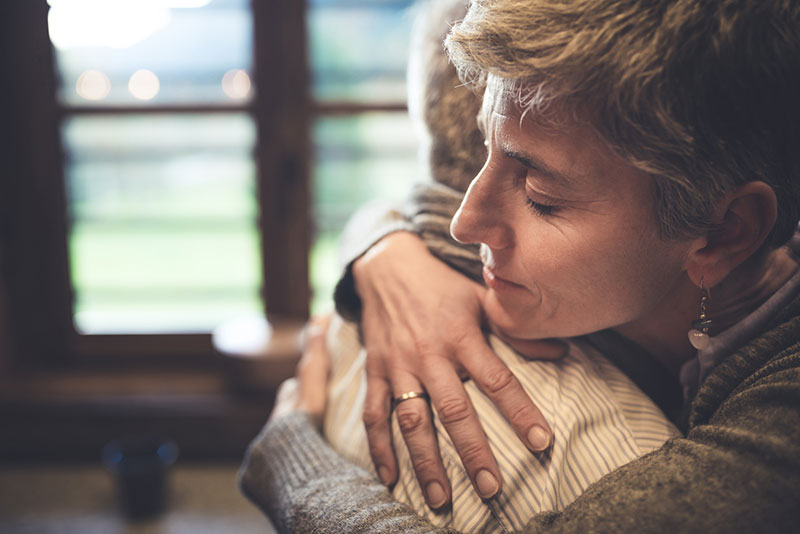
The passing of a loved one is a hard time for all, but this guide can help family members keep up with all the end-of-life tasks that need to be handled.
It is not something we would like to think of, preferring to push thoughts of the passing of a loved one and final plans to the back burner. Still, procrastination in this instance tends to make an already difficult time much more stressful.
Following the passing of a loved one, there are a number of administrative tasks that need to be handled. Knowing where to begin and what to do can feel overwhelming, especially while navigating grief. To help alleviate some of the stress during this time, our at-home care specialists have developed the following helpful timeline so you’ll know specifically what should be taken care of when someone you love passes away.
First Steps: Immediately
- Get a declaration of death. Depending upon the person’s location at the time of passing, this might be provided by a hospice nurse, or staff in a hospital or long-term care facility. If you’re caring for the person in the home without the support of medical experts, call 911. EMTs will provide transport to the hospital for a legal pronouncement of death.
- Alert family and friends. There are lots of ways you can make this happen, based on what’s most comfortable for you. You may like to personally contact each individual through a telephone call, email, or in-person visit. You might want to ask for assistance, assigning others to contact a specific group of people (i.e., neighbors, faith community members, friends, etc.) to help spread the word. Or you might want to post on social media, so you can make one announcement that reaches everyone in the person’s group of acquaintances.
- Schedule a gathering with immediate family to talk about funeral plans. If the senior had prepaid/preplanned final arrangements, review those plans with immediate family. If not, you can start the conversation on preliminary information: which funeral home you’d like to use, the available budget, and any high-level details that you’d like to be sure to include.
Next Steps: Within a Few Days of Passing
- Finalize funeral arrangements. Utilizing the information from your initial family gathering, meet with the funeral home staff to work through the details:
- Will the senior be buried or cremated?
- Which type of casket or urn might you want?
- Where will the funeral or memorial service be held?
- Who will write the obituary? Serve as pallbearers? Speak during the service? Handle thank-you notes? Arrange for a post-funeral gathering?
- Ensure the property and any belongings are safe. Lock up any jewelry, cash, or other valuable belongings, along with the person’s home and vehicle. Additionally, if the person had any pets, determine who can take over possession – making sure they receive lots of attention and care, as they will be impacted by the loss and changes too.
- Forward mail. The post office can set up a forwarding order so the senior’s mail will be sent straight to the person taking care of their affairs. The designated person will also want to keep track of mail to end subscriptions and services, deal with any bills, etc.
Final Steps: A Couple of Weeks After Passing
- Pull together documents. Request ten certified copies of the death certificate, which will be essential to close bank accounts, file insurance claims, and more. The funeral home can assist you with this, or you can acquire them yourself through the state vital records office. You will also need to find the person’s will and determine who the executor is.
- Speak to an attorney and CPA. Legal counsel, chosen by the executor, will ease the task of settling the estate and distributing possessions. A CPA can assist with filing the last tax return on the person’s behalf.
- Alert other organizations. The funeral home should contact the Social Security Administration, but you will want to confirm this. Additionally, if the person had a life insurance policy, this is the time to file a claim. Talk with the person’s bank(s), stockbrokers, and financial advisers to determine the beneficiary of the accounts and provide a copy of the death certificate. You’ll also need to close any credit card accounts and get in touch with the DMV to cancel their driver’s license.
With the passing of a loved one, there is frequently a surviving spouse who needs support and care. Live Free Home Health Care, an award-winning provider of home care in Concord, NH and the surrounding areas, is here to help. Our team is here to provide compassionate companionship to ease loneliness, prepare nutritious meals, assist with personal care needs, and much more. Let us help so that you can focus on the personal and legal details following a loved one’s passing. Give us a call at 603-217-0149 to learn more about our in-home care services.
